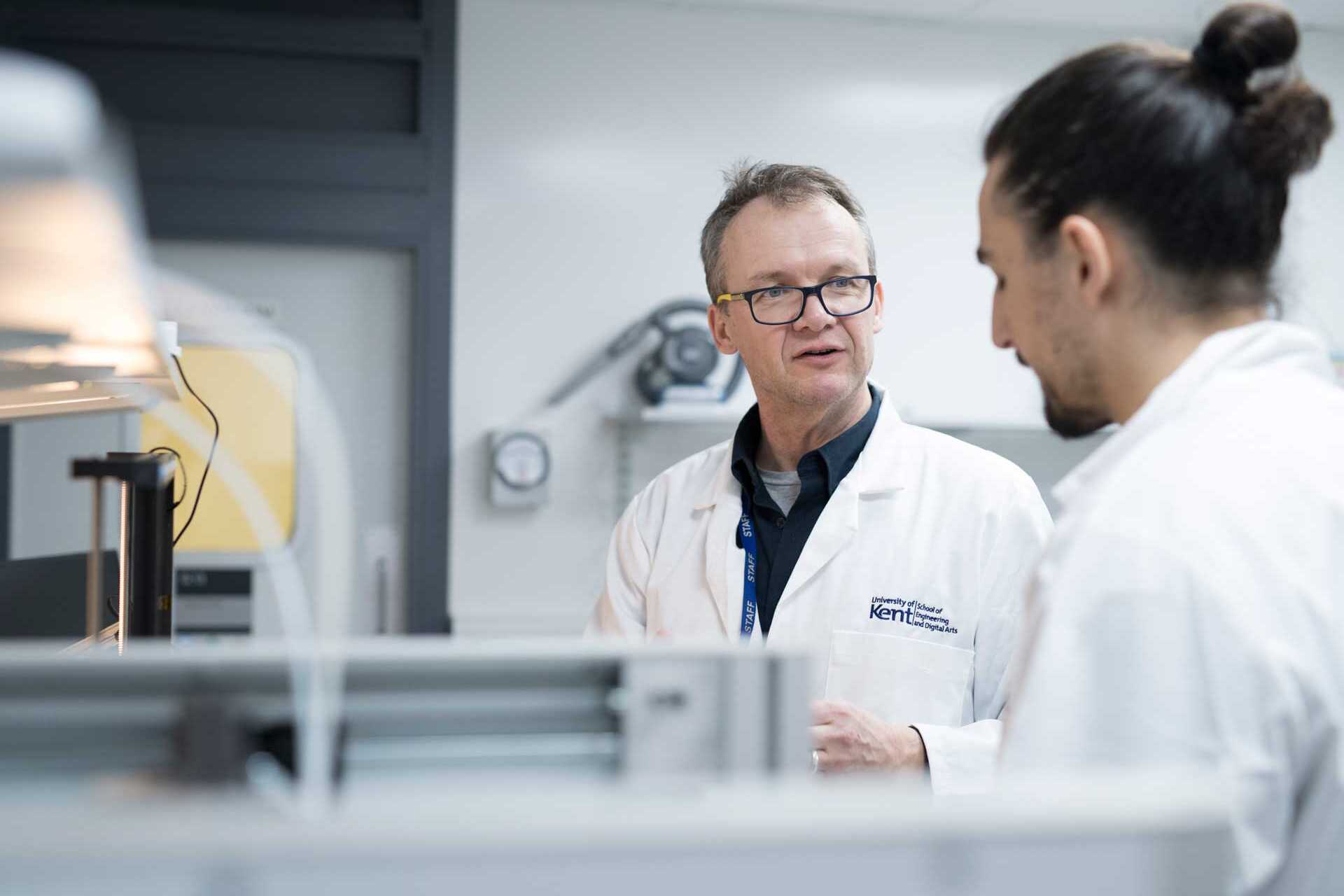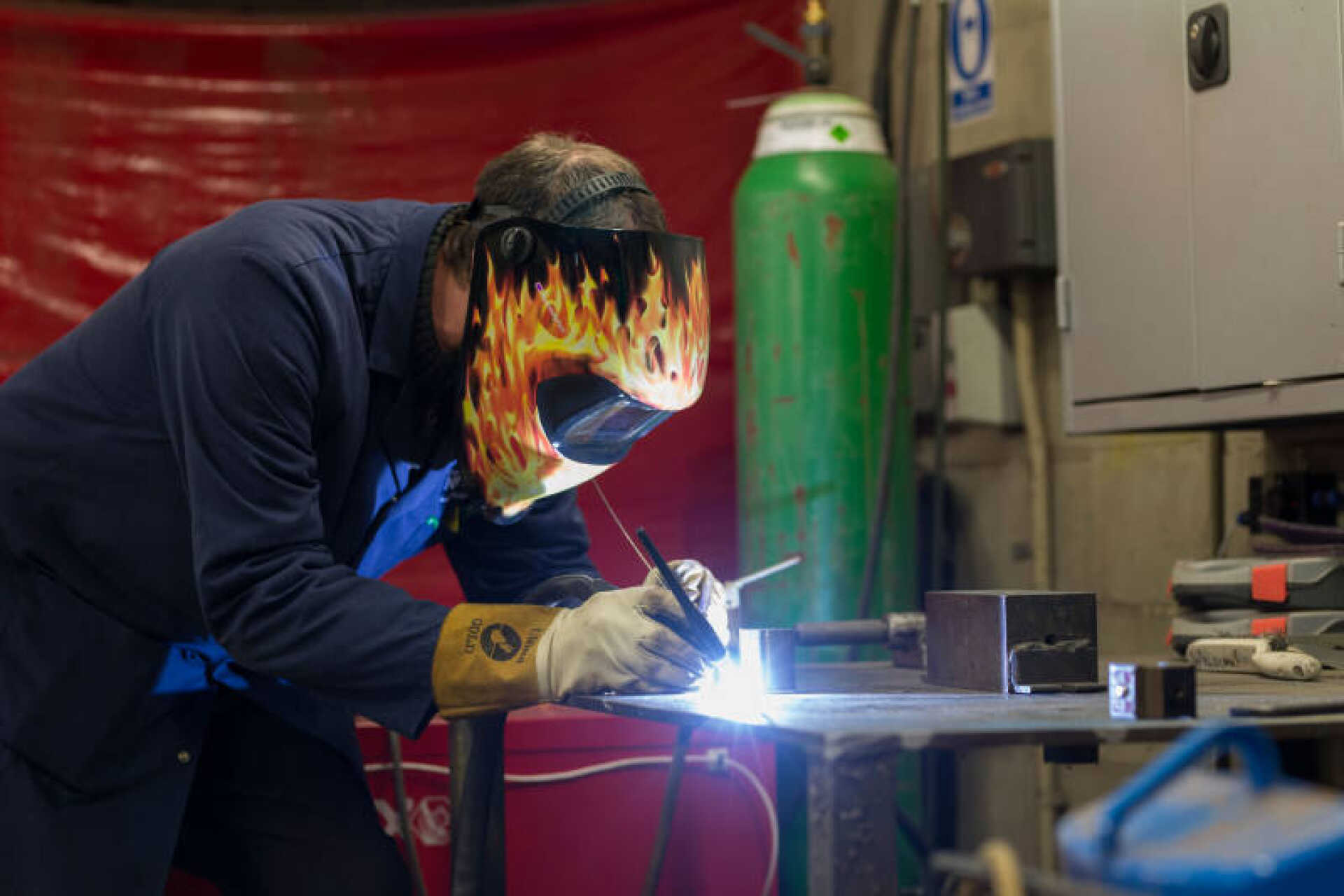Biomedical Engineering
with a Year in Industry
Gain skills to build the product of the future.

Gain skills to build the product of the future.
Business and research environments need engineers who can design complete solutions involving complex integrated systems. Biomedical Engineering at Kent educates engineers that can develop systems used in medical practice and biology research.
This cross-disciplinary programme is designed for students with an equally strong interest in engineering and biology/medicine. Drawing from our established expertise in engineering technologies and from the research synergies with Biosciences, this degree produces engineers with a solid knowledge in biology and medical science.
Your Year in Industry takes place between your second and final years. As well as gaining invaluable workplace experience, you also have the chance to evaluate a particular career path, and, if your industrial placement goes well, you may be offered a job by that employer after graduation.

We have excellent industrial links, providing you with many placement opportunities.
94% of our Biomedical Engineering students were positive about the teaching on their course. (NSS 2024)

Medical Technology and Bioengineering at Kent was ranked 11th overall in The Complete University Guide 2025.

"Kent equipped me with the skills to problem solve and to approach tasks with an engineering mindset". We spoke to James Lewis-Cheetham.
Our typical offer levels are listed below and include indicative contextual offers. If you hold alternative qualifications just get in touch and we'll be glad to discuss these with you.
BBB including B in Mathematics plus one other STEM subject.
DMM in an Engineering subject including Further Maths/Further Maths for Engineering Technicians/Calculus to Solve Engineering Problems. Other subjects are considered on a case-by-case basis. Please contact us for further advice on your individual circumstances.
120 tariff points from your IB Diploma, including Maths (not Maths Studies) at 5 at HL or 6 at SL, or Maths: Analysis and Approaches at 5 at HL or 6 at SL, or Maths: Applications and Interpretations at 5 at HL or 6 at SL, and a science subject at 5 at HL or 6 at SL, typically H5, H6, H6 or equivalent.
N/A
The University will consider applicants holding T level qualifications in subjects closely aligned to the course.
A typical offer would be to obtain the Access to HE Diploma in a suitable subject with a minimum of 45 credits at Level 3, with 24 credits at Distinction and 21 credits at Merit.
The following modules are what students typically study, but this may change year to year in response to new developments and innovations.
Mathematics is the fundamental language of engineering, allowing complex ideas to be described, formulated and developed. This module gives you a strong foundation of key mathematical techniques and methods required by most other modules in our engineering courses.
Topics covered include complex numbers, calculus, linear algebra, statistics and probability. Throughout the module, you’ll tackle real-world engineering problems. These include the study of mechanical and electrical systems, the use of complex numbers and linear algebra for the analysis of electrical circuits and the use of statistics and probability in the analysis of experimental data.
Electronics underpins all of modern life, from everyday household items to the most sophisticated supercomputers. It enables devices such as ultra-low power wearable health monitors through to megawatt wind turbines.
You’ll begin your engineering journey by learning fundamental circuit analysis and fabrication skills. This will enable you to begin engineering project work right from your first year.
You’ll also explore the vital and trusted role that engineers play in supporting and transforming society and infrastructure. You’ll do this by demonstrating your ability to consider societal issues essential to modern professional engineering.
Programming underpins all facets of modern life, from basic software applications to complex artificial intelligence systems. It enables everything from simple mobile apps to large-scale enterprise solutions.
You'll embark on your programming journey here, mastering fundamental coding concepts and development skills. This foundation will empower you to dive into programming projects right from your first year through lectures, workshops and programming challenges.
You’ll also examine the pivotal role of programmers in shaping and advancing society by exploring ethical and societal considerations essential to contemporary professional programming.
The success of an engineering product relies on the combination of careful mechanical design, strategic material selection, and a deep understanding of mechanics. These elements collectively shape the product's performance, durability, and overall effectiveness, highlighting their essential role in the development of any successful engineering solution.
You'll learn how to develop an engineering drawing of a product using a Computer-Aided Design (CAD) system and choose the best materials from a wide range of available engineering materials for your designed components.
This material selection process depends on the mechanical analysis of a component under various loading scenarios, which you will learn in this module. This knowledge will enable you to start developing an engineering project from your first year of study and practise it throughout your degree.
What essential practical skills and knowledge do biomedical engineers need to succeed in the field? This module gives a comprehensive response to that question by focusing on three core components.
Physiological Systems of the Human Body delves into cell structure, organ systems, and prerequisites for understanding physiology and disease. Biomedical Laboratory Skills, examines techniques such as dilutions, microscopy, bioinformatics, and programming in R for biosciences. Technical Approach to Medical Electronics covers topics like error analysis, measurement principles, instrumentation, and electronic circuits relevant to medical applications.
This integrated approach gives you a strong foundation in both theoretical understanding and hands-on proficiency, preparing you to tackle complex challenges at the intersection of engineering and healthcare with confidence and expertise.
To bring your engineering education to life, you’ll do a project in each year of study. In the Stage 1 project, you'll gain hands-on experience, allowing you to apply theoretical knowledge to real-world problems. It will enhance your understanding of engineering principles and concepts.
Throughout this process, you’ll apply electronic and mechanical design skills and programming/software knowledge to describe and produce a physical solution alongside a technical specification. You are expected to gain a foundational understanding of engineering hardware and software integration and verification.
The module progresses through lectures, workshops, and labs, tutorials with supervision and technical guidance. It aims to provide you with hands-on and problem-solving skills in the concepts elucidated in the Term 1 and Term 2 modules.

I love hearing about the latest technologies and how they can be applied.Matthew Howes - Biomedical Science BSc
Engineers work in interdisciplinary teams to overcome the challenges of intelligent engineering systems. Smart engineering systems are not simple mechanical or electronic components, but the result of synergistic integration between mechanical engineering, electronics, computer science and control.
You’ll learn to apply this interdisciplinary approach to develop innovative solutions that would not be possible with a single-discipline focus. You’ll gain applied knowledge of sensors, actuators, and data acquisition techniques which are crucial to modern engineering. After mastering the foundational concepts, you’ll progress to cover transducers, mechanical components and modelling of mechatronic systems.
You’ll further explore microprocessors and data acquisition processes and become familiar with actuator functions within mechatronic systems. Practical sessions will complement your theoretical learning, allowing you to apply concepts in hands-on scenarios with real-world systems.
Biomechanics is the application of mechanical principles to living organisms. It comprises the mechanical and physiological aspects of biological (human) bodies and forms a vital part of bioengineering. Through a blend of theoretical study and practical application, you'll learn the interplay between physics, physiology, and engineering as they relate to the human body.
You’ll acquire the ability to analyse the impact of forces on the human body's structures. You'll gain first-hand experience through practical mini-projects, computer simulations, and by examining human movement patterns.
Moreover, you’ll develop the ability to apply critical thinking skills to biomechanical principles to solve complex problems in areas such as human movement and rehabilitation devices. By the end of the module, you’ll have a solid foundation in biomechanics which will prepare you for careers in research, healthcare, sports science, engineering, and beyond.
How does your body operate normally, and what happens when health issues arise?
You will explore the anatomy and physiology of healthy tissues, organs, and the major bodily systems. By reviewing and interpreting engaging case studies, you will connect theoretical knowledge with real-life health conditions that impact these systems.
Through these explorations, you will gain a deeper understanding of the causes of these diseases, the important diagnostic techniques we can use to assess them, and how we might treat them.
Image analysis techniques give computers the power to enhance, interpret and understand visual inputs. These techniques are integral to many applications such as autonomous vehicles, medical diagnosis, document processing, biometric security and surveillance.
You’ll learn the principles of image analysis techniques alongside their practical applications. Starting from basic image formation and acquisition, you’ll learn core image processing techniques such as how to filter noise, how to extract object outlines, how to identify regions of interest in an image (segmentation), and about image feature descriptors.
You’ll also explore various supervised and unsupervised classification techniques (including neural networks) for object recognition. You’ll discover several real-world applications of image analysis and learn through lab-based exercises and a mini-project.
You have the option to add a year in industry to this course. We already know you have the confidence and commitment to thrive in the workplace and kick-start your career. This is your chance to prove it, to yourself and to employers.
When should I start looking? In the summer of your first year; placements must be secured by 31 August in your second year.
Where can I get help finding a placement? Book an appointment with a placement adviser via the careers service.
Will I get paid? Most of our placements are paid.
Do I have to pay tuition fees? Yes, you’ll pay a substantially reduced fee, currently £1,850, which for UK students is covered by Student Finance.
Where can I get visa advice if I’m an international student? Kent Union can help with any visa queries for your Year in Industry.
Does the University keep in touch? You receive four-weekly check-in emails, a visit from the team every three months and you can reach out to us any time by email or phone.
Do I work for a full year? The minimum requirement for an industrial placement is 44 weeks.
What could you do in a year?My year in industry couldn’t have gone better. I secured a role at IBM, working in their sports and entertainment department – it was perfect for meTom Tillin Find out more
What are the advanced techniques and principles essential for monitoring and analysing physiological parameters in medical contexts? In this module, you’ll study advanced instrumentation methods, signal processing techniques, and data analysis algorithms tailored for biomedical applications. Key areas covered include biosensors, bioelectric signals and vital sign monitoring.
Additionally, the module emphasises the importance of accuracy, reliability, and safety in physiological measurements, preparing you to be able to design, develop, and evaluate innovative medical devices and systems.
Through theoretical lectures, hands-on laboratory sessions, and practical projects, you’ll gain the necessary expertise to contribute meaningfully to the field of biomedical engineering by advancing state-of-the-art physiological measurement technologies.
Robotics and artificial intelligence (AI) are currently the most exciting fields in engineering. We are preparing for a robotics and AI revolution that will change our lives at every level and bring us one step closer to the integration of humans and machines.
You’ll comprehensively explore the key concepts in robotics and artificial intelligence and gain essential subject knowledge. You’ll learn theoretical tools to describe kinematics and dynamics for industrial robot systems with several degrees of freedom and use cutting-edge AI and machine learning (ML) algorithms in robots. You’ll also discover software/hardware integration in robot architectures for advanced tasks (e.g. obstacle avoidance learning), industrial applications and the adoption of AI in robotics.
You’ll progress to cover industrial tests as well as statics and dynamics of robots, dynamic modelling, and industrial control strategies. By the end of the module, you’ll be equipped with a solid foundation in robotics and AI, and be empowered with essential theoretical knowledge and practical skills for designing, modelling, and controlling robotic systems.
This is an opportunity for independent study on a topic of your own choice. Working on the project is a major part of your final year of study, taking place in spring and summer terms. It’s a chance for you to conduct in-depth research on a subject that is relevant to your course, helping you to further develop essential skills.
It will also challenge you to solve problems which involve the critical consideration of engineering and relevant legal, social, ethical and professional issues. It will enable you to develop and practise a professional approach to delivering written and oral presentations. You will be allocated a supervisor who will support you through weekly meetings and other communications.
To help you build the required knowledge and skills you’ll need for a successful engineering project, you’ll attend a series of lectures and workshops. These will cover topics such as design and production techniques; reliability, availability, maintainability and safety (RAMS), quality, safety and electromagnetic compatibility (EMC); as well as ethical, environmental and EDI (equality, diversity and inclusion) issues.
Biomaterials are substances designed to interact with biological systems. They serve various purposes such as assessment, treatment, support, or replacement of tissues, organs, or bodily functions.
The objective of this module is to give you a comprehensive understanding of biomaterials, emphasising their interactions within the biological environment. The module begins by examining the mechanics of materials, covering fundamental concepts such as stress, strain, bending, and shear. You’ll then look at a diverse range of biomaterials and their applications within the human body.
You’ll develop critical thinking skills and apply biomaterial principles to solve complex problems in areas such as the development of human implants. This module gives you a solid foundation in biomaterials, preparing you for careers in research, healthcare, engineering, and beyond.
Classical and modern manufacturing technologies play a key role in driving product development and innovation across various industrial sectors. Integrating these technologies into industrial applications promotes sustainable design and manufacturing, minimises waste and resource consumption and boosts the fabrication of new products and materials.
You’ll gain knowledge of state-of-the-art manufacturing technologies and modern techniques such as additive manufacturing. You’ll then acquire practical skills in using these technologies through several lab sessions and practices. This module also promotes the principles of sustainable design and green manufacturing, both of which reduce environmental impact and promote long-term viability and resilience.
Embedded systems in conjunction with the Internet of Things (IoT) are used to create systems that can sense in real-time different aspects of their environment, collect and transmit information for a vast number of applications including smart cities, smart agriculture and smart factories (Industry 4.0). This information can then be used to transform the day-to-day operation of our cities and businesses making them more efficient and less wasteful of resources.
This module introduces the theory and practice of employing computers as the control and organisational centre of embedded systems and examines time-critical systems. You'll also cover design aspects of embedded systems and IoT through practical work, including real-time operating systems and microcomputer programming.
You will learn how to use the internal peripherals of a microcontroller by working directly at the hardware register level and as such gain a good understanding of the interactions between software and hardware. Many practical applications of embedded systems require real-time operation under strict deadlines (e.g., in factory automation). As such, the module also covers the concepts of real-time operating systems and features that are essential for time-critical operation. IoT can be used as the backbone communication infrastructure in embedded applications and the skills and knowledge you develop will be crucial in your future career.
In today's interconnected world, cyber security is not just important – it is essential. From businesses to schools, homes, personal devices, and even vehicles, everything is connected! This module dives deep into the fascinating realm where cyber security – including general topics and specialist areas such as cryptography – take centre stage.
Get ready to explore how these fields shape the modern technology landscape, from fundamental security principles to the intricate dance between risk management, cybercrime, usable security and professional aspects. You'll unravel the mysteries of ciphers, delve into the world of symmetric and asymmetric cryptography, and even take a critical look at cyber-attacks. You'll also examine their social and technical dimensions and explore effective risk treatment measures. This includes robust security controls and the use of upcoming mechanisms such as cyber insurance.
The knowledge you will gain on this module provides a strong foundation to guide and inform security efforts within an organisation. Prepare to embark on a journey where every click, every byte, and every line of code matters – and where you knowledge can make a real difference.
Teaching is delivered through lectures, tutorial lectures, demonstrator-led examples classes, tutor-led small group supervisions; project work; laboratory experiments and computer-based assignments. Case studies on industry hot topics and emerging technologies. In particular the first, second and third-year projects give hands-on experience of electronic design and project management.
Problem-solving workshops allow you to develop skills in applying biomedical knowledge to the solution of problems. Practical classes teach specific laboratory skills and demonstrate how they can be used to investigate biomedical systems.
Written unseen examinations; assessed coursework in the form of examples class assignments, laboratory write-ups, assessed project work, assignments and essays and class tests.
For a student studying full time, each academic year of the programme will comprise 1200 learning hours which include both direct contact hours and private study hours. The precise breakdown of hours will be subject dependent and will vary according to modules.
Methods of assessment will vary according to subject specialism and individual modules.
Please refer to the individual module details under Course Structure.
For course aims and learning outcomes please see the course specification.
You'll develop into a well-rounded graduate, confident of your future opportunities as we support you to recognise and learn the essential skills and attributes needed by industries in the UK and overseas.
This course has been designed in discussion with industrial employers, our Industrial Panel, IET, our graduates, and students. This allows the latest real-world developments and latest academic research to be included in the curriculum. Lecturers and guest speakers include those with industry experience and experience working with industry on research and commercial innovation. We use this industrial knowledge and our networks to support your development.
Accreditation will be sought from the Institution of IET enabling students to satisfy the partial educational requirements of the IET for Chartered Engineer (CEng) registration upon successful completion of the course.
The Careers and Employability Service supports you when looking for graduate employment, placements, work experience, internships, and volunteering. They help you to identify career paths, and support you through applications, interviews and assessment centres. They also provide a programme of events, giving you industry insight and an opportunity to network.

*The Government announced on 4 November 2024 that tuition fees in England for Home students will increase to £9,535 from £9,250 for the academic year 2025/26. This increase requires Parliamentary approval, which is expected to be given in early/mid 2025.
Tuition fees may be increased in the second and subsequent years of your course. Detailed information on possible future increases in tuition fees is contained in the Tuition Fees Increase Policy.
The University will assess your fee status as part of the application process. If you are uncertain about your fee status you may wish to seek advice from UKCISA before applying.
For details of when and how to pay fees and charges, please see our Student Finance Guide.
Fees for undergraduate students are £1,900.
Fees for undergraduate students are £1,430.
Students studying abroad for less than one academic year will pay full fees according to their fee status.
Students will require regular access to a desktop computer/laptop with an internet connection to use the University of Kent’s online resources and systems. Please see information about the minimum computer requirements for study.
There may be additional costs associated with the Year in Professional Practice such as travel or accommodation, which will need to be covered by the student. Please see Careers and Employability webpages for more information.
Find out more about accommodation and living costs, plus general additional costs that you may pay when studying at Kent.
Kent offers generous financial support schemes to assist eligible undergraduate students during their studies. See our funding page for more details.

We have a range of subject-specific awards and scholarships for academic, sporting and musical achievement.
We welcome applications from students all around the world with a wide range of international qualifications.

Student Life

Powered by progress
Kent has climbed 12 places to reach the top 40 in The Times Good University Guide 2025.
Kent Sport
Kent has risen 11 places in THE’s REF 2021 ranking, confirming us as a leading research university.

An unmissable part of your student experience.